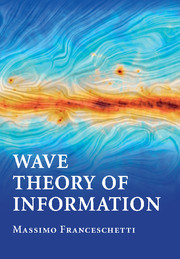Book contents
- Frontmatter
- Miscellaneous Frontmatter
- Dedication
- Contents
- Preface
- Notation
- 1 Introduction
- 2 Signals
- 3 Functional Approximation
- 4 Electromagnetic Propagation
- 5 Deterministic Representations
- 6 Stochastic Representations
- 7 Communication Technologies
- 8 The Space–Wavenumber Domain
- 9 The Time–Frequency Domain
- 10 Multiple Scattering Theory
- 11 Noise Processes
- 12 Information-Theoretic Quantities
- 13 Universal Entropy Bounds
- Appendix A Elements of Functional Analysis
- Appendix B Vector Calculus
- Appendix C Methods for Asymptotic Evaluation of Integrals
- Appendix D Stochastic Integration
- Appendix E Special Functions
- Appendix F Electromagnetic Spectrum
- Bibliography
- Index
1 - Introduction
Published online by Cambridge University Press: 30 November 2017
- Frontmatter
- Miscellaneous Frontmatter
- Dedication
- Contents
- Preface
- Notation
- 1 Introduction
- 2 Signals
- 3 Functional Approximation
- 4 Electromagnetic Propagation
- 5 Deterministic Representations
- 6 Stochastic Representations
- 7 Communication Technologies
- 8 The Space–Wavenumber Domain
- 9 The Time–Frequency Domain
- 10 Multiple Scattering Theory
- 11 Noise Processes
- 12 Information-Theoretic Quantities
- 13 Universal Entropy Bounds
- Appendix A Elements of Functional Analysis
- Appendix B Vector Calculus
- Appendix C Methods for Asymptotic Evaluation of Integrals
- Appendix D Stochastic Integration
- Appendix E Special Functions
- Appendix F Electromagnetic Spectrum
- Bibliography
- Index
Summary
Nihil est in intellectu quod non prius fuerit in sensu.
The Physics of Information
This book describes the limits for the communication of information with waves. How many ideas can we communicate by writing on a sheet of paper? How well can we hear a concert? How many details can we distinguish in an image? How much data can we get from our internet connection? These are all questions related to the transport of information by waves. Our sensing ability to capture the differences between distinct waveforms dictates the limits of the amount of information that is delivered by a propagating wave. The problem of quantifying this precisely requires a mathematical description and a physical understanding of both the propagation and the communication processes.
We focus on the propagation of electromagnetic waves as described by Maxwell's theory of electromagnetism, and on communication as described by Shannon's theory of information. Although our treatment is mostly based on classical field theory, we also consider limiting regimes where the classical theory must give way to discrete quantum formulations. The old question of whether information is physics or mathematics resounds here. Information is certainly described mathematically, but we argue that it also has a definite physical structure. The central theme of this book is that Shannon's information-theoretic limits are natural. They are revealed by observing physical quantities at certain asymptotic scales where finite dimensionality emerges and observational uncertainties are averaged out. These limits are also rigorous, and obey the mathematical rules that govern the model of reality on which the physical theories are based.
Shannon's Laws
Originally introduced by Claude Elwood Shannon in 1948, and continuing up to its latest developments in multi-user communication networks, information theory describes in the language of mathematics the limits for the communication of information. These limits are operational, of real engineering significance, and independent of the semantic aspects associated with the communication process.
- Type
- Chapter
- Information
- Wave Theory of Information , pp. 1 - 47Publisher: Cambridge University PressPrint publication year: 2017

